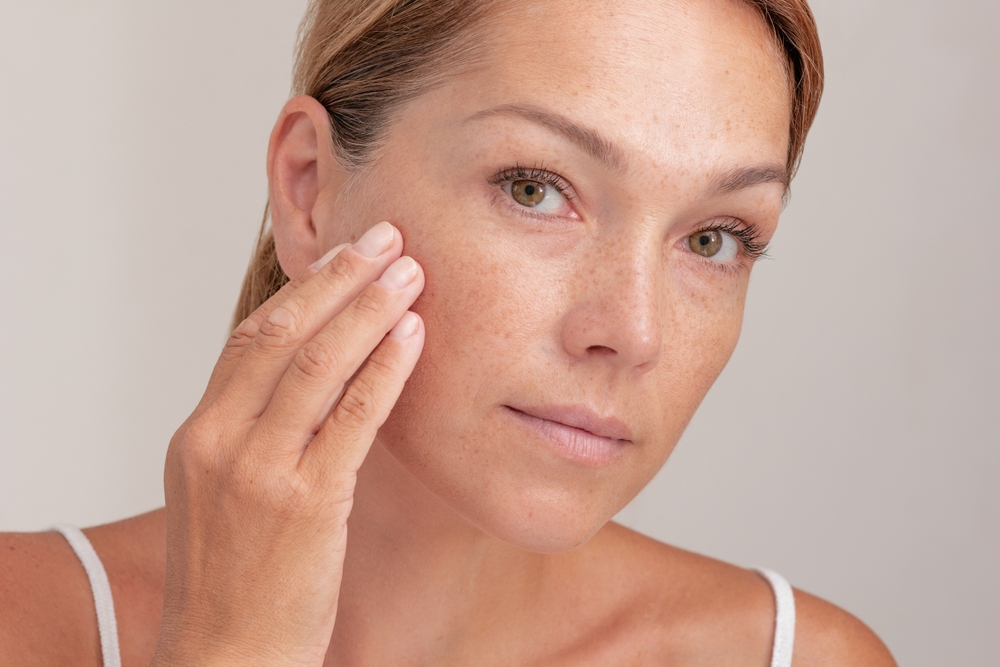Dark spots, also known as hyperpigmentation, are a common skin concern affecting individuals of all ages and skin types. These spots, which appear as patches of skin darker than the surrounding area, can vary in size and shape. Understanding dark spots and how they form can help you take the necessary steps to prevent and treat them effectively.
What Are Dark Spots?
Dark spots on the face are areas where the skin produces excess melanin, the pigment responsible for skin color. This condition is medically referred to as hyperpigmentation. Various factors can trigger the overproduction of melanin, leading to the appearance of these spots.
What Causes Dark Spots?
Dark spots on the face are common and can be caused by various factors. Understanding these causes can help prevent and treat these skin imperfections effectively.
Sun Exposure
Ultraviolet (UV) rays from the sun significantly cause dark spots. Prolonged and unprotected exposure to the sun stimulates melanin production, which can result in sunspots or age spots.
Hormonal Changes
Hormonal fluctuations, especially during pregnancy or from taking certain birth control pills, can lead to melasma. This condition manifests as dark, blotchy spots on the face, making the skin appear uneven.
Post-Inflammatory Hyperpigmentation (PIH)
Dark spots can develop after an inflammatory skin condition such as acne, eczema, or injury. As the skin heals, it may produce excess melanin, leaving a persistent dark spot.
Aging
The cumulative effects of sun exposure and environmental factors can cause age spots as the skin ages. These dark spots are common in older adults and result from prolonged UV exposure.
Medications
Certain medications, including some antibiotics and chemotherapy drugs, can increase the skin’s sensitivity to the sun. This heightened sensitivity can lead to hyperpigmentation when the skin is exposed to UV rays.
Genetics
Genetic predisposition plays a role in the development of dark spots. Due to their genetic makeup, individuals with a family history of hyperpigmentation are more likely to experience these skin changes.
How Do Dark Spots Appear?
Dark spots form when the skin’s melanin production is disrupted, leading to concentrated areas of pigmentation. This process can be triggered by:
UV Radiation
UV rays penetrate the skin, causing melanocytes (cells that produce melanin) to become overactive. This overactivity increases pigment production as a defense mechanism, leading to dark spots.
Inflammation
Skin inflammation from acne, cuts, or other injuries can stimulate melanin production as the skin heals. The inflammation triggers melanocytes to produce excess pigment, resulting in post-inflammatory hyperpigmentation.
Hormonal Changes
Hormones can influence melanin production, especially during pregnancy or from hormonal therapies. This hormonal influence can cause uneven pigmentation, such as melasma, which appears as dark, blotchy patches on the skin.
How Can You Prevent Dark Spots from Forming?
Preventing dark spots involves several proactive measures to protect your skin. Regularly using a broad-spectrum sunscreen with an SPF of 30 or higher is crucial, as it shields the skin from harmful UV rays that can trigger melanin overproduction. Wearing protective clothing and seeking shade during peak sun hours can reduce exposure.
Incorporating skincare products with ingredients like vitamin C, niacinamide, and retinoids can help to inhibit melanin production and promote a more even skin tone. Avoid picking at blemishes or injuries, which can lead to post-inflammatory hyperpigmentation. Additionally, managing hormonal changes with medical guidance and being cautious with medications that increase sun sensitivity can help prevent dark spots.
How Long Does It Take to See Results From Dark Spot Treatments?
The time it takes to see results from dark spot treatments varies depending on the treatment method and the severity of the hyperpigmentation. Topical treatments may take several weeks to a few months to show noticeable improvements as the skin gradually renews and lightens the dark spots.
Professional treatments like chemical peels and IPL therapy can produce results more quickly, often within a few sessions. Consistency in treatment and following a comprehensive skincare regimen, including sun protection, are key to achieving and maintaining the desired results.
What Treatments Do We Provide for Dark Spot Removal?
Dark spots can be effectively treated using various advanced techniques. Here, we offer specialized treatments to help you achieve clearer, more even-toned skin. Two of the most effective treatments we provide for dark spot removal are chemical peels and IPL (intense pulsed light) therapy.
Chemical Peels
Chemical peels involve applying a solution to the skin that exfoliates the outermost layers. This treatment helps remove dead skin cells and stimulate the growth of new, healthy skin growth. By peeling away the damaged skin, chemical peels can reduce the appearance of dark spots and improve overall skin tone and texture.
IPL
IPL therapy uses broad-spectrum light to target and break down pigment within the skin. The light energy penetrates the skin and is absorbed by the dark spots, causing them to gradually fade. IPL treats dark spots and addresses other skin concerns, such as redness and fine lines, resulting in a more youthful and radiant complexion.
Achieve Clear, Even-Toned Skin With Dark Spot Removal in Baton Rouge, LA
Dark spots can be a frustrating skin concern, but with the right knowledge and treatments, they can be effectively managed and even eliminated. From understanding the causes and preventive measures to exploring various treatment options, taking proactive steps can significantly improve your skin’s appearance.
At Nunnally Dermatology in Baton Rouge, LA, we are dedicated to helping you achieve clear, even-toned skin through personalized treatment plans tailored to your unique needs. Contact us online or call (225) 769-3376 for a consultation with us.


